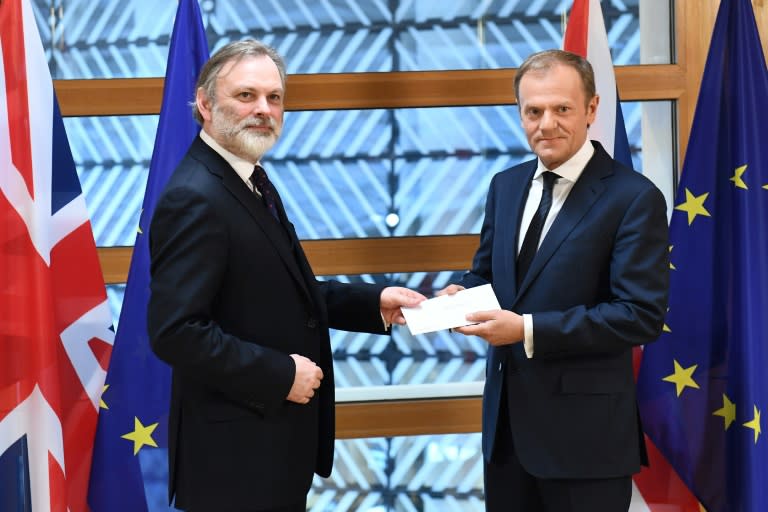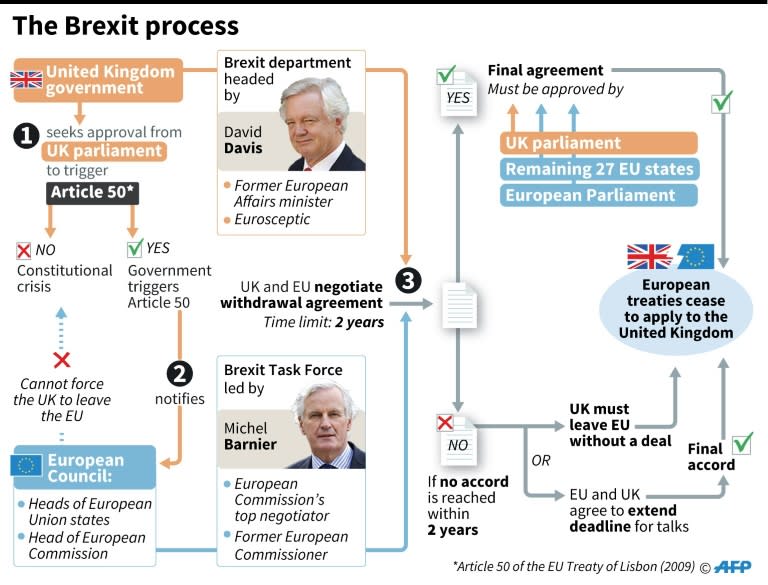Brexit: What we know
As British Prime Minister Theresa May fired the starting gun on leaving the European Union on Wednesday, here is an outline of what we know: - Timing - Britons voted by 52 percent to 48 percent to leave the EU in a referendum in June 2016. May implemented that decision on Wednesday by triggering Article 50 of the EU's Lisbon Treaty, which opens a two-year window for negotiations with Brussels to leave the 28-member bloc. The EU has said it will issue an initial outline for Brexit talks on Friday, before finalising its strategy at a summit of EU leaders on April 29. Formal talks between London and Brussels are not expected to start for at least three weeks after that, and may not get down to detailed discussions until after elections in Germany, due in September. The European Commission's Brexit negotiator, Michel Barnier, has said the talks must be wrapped up by October 2018 to give the EU Parliament time to ratify the deal. Other parliaments at national level may also need to approve it. - Immigration - May will prioritise reducing the hundreds of thousands of immigrants from the rest of the bloc who move to Britain each year, after the issue dominated the referendum campaign. Brexit minister David Davis has said there would be no sudden drop in numbers, as it would take years to fill low-skilled jobs in hospitality, health and agriculture currently done by immigrants. "From time to time we will need more, from time to time we will need less," he said on the BBC this week. Both sides have said they would like early resolution of the status of more than three million Europeans living in Britain, and more than one million Britons living elsewhere in the EU. - Trade - May acknowledges this will mean leaving Europe's single market, of which freedom of movement is a key principle, and probably also the customs union. Amid fears of the impact on jobs and growth of leaving the single market, May is pushing for "maximum possible access" for British companies. The government has indicated that Britain could make contributions to the EU budget to ensure trade access. Continued full membership of the customs union is unlikely as it would prevent Britain striking its own trade deals with non-EU countries. - Huge exit bill - Britain believes it can negotiate the exit agreement and a deal on future relations within the two years, but diplomats are sceptical. Some in the EU argue that the divorce must be finalised first -- including the contentious issue of Britain's outstanding bills, which EU officials have estimated at around 60 billion euros ($65 billion). European leaders have also warned that Britain cannot get a better deal with Europe when it is outside the EU than when it was inside, amid fears Brexit could encourage other nations to leave the bloc. - No deal? - May has said she wants a new relationship that is good for Britain and the EU, but would rather walk away than accept a bad deal, although a growing number of business leaders have warned against this. Without a new trade agreement, Britain would fall back on World Trade Organization (WTO) rules, which could mean higher export tariffs and other barriers. In addition, failure to strike a deal would weaken cooperation in the fight against terrorism and crime, May said in her letter Wednesday. "In this kind of scenario, both the United Kingdom and the European Union would of course cope with the change, but it is not the outcome that either side should seek. "We must therefore work hard to avoid that outcome." - Parliament - May has promised parliament a vote on the final Brexit deal, but warned that rejecting it meant Britain would leave without any agreement. Other battles lie ahead, particularly over a so-called Great Repeal Bill. To be introduced later this year, the bill will repeal the 1972 European Communities Act under which the Britain joined the EU, and subsume more than four decades of European law into British law. MPs would then decide which laws to reject, adopt or amend. The government is due to publish a paper outlining its plans for this bill on Thursday.



